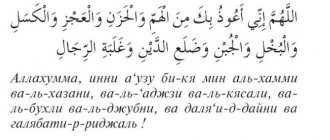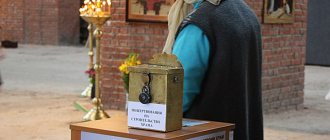How to make dua (supplication) correctly
Making dua occupies a special place in our lives. We must know the basic rules of supplication.
- While making dua, you should raise your hands, but you should not look at the heavens. In one hadith, the Prophet (peace be upon him) said: “If people do not stop directing their gaze to the sky while making dua, they will go blind” (Muslim).
- You should try to make dua in a state of ablution and immediately after performing the desired or obligatory prayer.
- Anyone who wants to make dua, if possible, should first please orphans and needy people with alms. It is also recommended to fast before performing an important dua.
- It is advisable to face the qiblah while making dua.
- Dua should be made in a low voice. The voice should be neither too quiet nor too loud. In Surah Al-Araf, verse 55, it is said: “Call upon your Lord with humility and secretion - Allah does not love those who transgress the boundaries set by Him.”
- Say words of praise to Allah Almighty and salawat to the prophet before starting the dua and at its completion.
Dua for difficulties and misfortune No. 1.
إِنَّا للهِ وَإِنَا إِلَـيْهِ راجِعُونَ، اللَّهُـمَّ اْجُـرْنِي ف ِي مُصِـيبَتِي، وَاخْلُـفْ لِي خَيْـراً مِنْـهَا
“Inna lilla h and wa inna ilay h and raji'un! Allah h umma-jurni fi muĉibati wahluf li khairan min ha.”
Meaning: “Verily, we belong to Allah and to Him we will return! O Allah, reward me for my misfortune and replace it with something better!”
The Prophet ﷺ said: “Whatever person who has suffered misfortune would say: “Verily, we belong to Allah and to Him we will return!” O Allah, reward me for my misfortune and replace it with something better!” Allah will definitely reward him for this misfortune and replace it with something better” (Imam Ahmad).
Several reasons to accept dua
Some reasons why the likelihood of dua being accepted is high:
- To be a musafir (traveler). The Messenger of Allah (peace be upon him) said: “The dua of three will certainly be accepted: the supplication of the oppressed without a reason, the supplication of a traveler, and the dua of a father for his children.” If the musafir is on a long journey, then the likelihood of accepting the dua is even higher. Because during long wanderings a person endures a lot of suffering, misses his homeland, so his sincerity increases. And sincerity is one of the important reasons for accepting dua.
- Raise your hands. Prophet Muhammad (peace and blessings of Allah be upon him) said: “Truly Allah is generous and shy. If a person raises his hands asking Him, then it is a shame for Him not to give what they ask.”
Dua for difficulties and misfortune No. 2.
All rights reserved. ِينَ
“La ila ha illa anta sub ẍanaka inni kuntu mina-ӟ-ӟalimin.”
Meaning: “There is no deity worthy of worship except You! Glory to You! Verily, I was one of the wrongdoers."
It is reported from the words of Sa'd ibn Abi Waqqas (may Allah be pleased with him) that the Messenger of God ﷺ said: “The prayer of Dhu-n-Nun (Yunus), which he said while in the belly of a whale: “There is no deity worthy of worship, except you! Glory to You! Verily, I was one of the wrongdoers." Whatever Muslim asks for anything through this prayer, he will definitely be answered!” (Imam at-Tirmidhi).
Differences between dua and prayer
Namaz is a five-fold prayer that is performed during the day at a certain time and includes a strict order of actions and spoken words.
It is a compulsory form of worship that men and women must perform upon reaching a certain age. There may be some differences between Islamic schools and denominations in the performance of prayer, but in general the order and words are the same. The words of prayer are pronounced in Arabic. This rule applies in any corner of the world where there are devout Muslims. Dua can be made both in Arabic and in your native language, pronouncing those words that a person considers necessary. As for Arabic, you can use ready-made dua formulas from the Koran or those pronounced by the Prophet (pbuh) and his companions.
From the above it follows that believers who do not know how to correctly make dua after prayer must follow the conditions discussed below.
Dua for difficulties and misfortune No. 3.
All rights reserved. All rights reserved. ورَبُّ وَرَبُّ الْأَرْضِ ورَبُّ الْعَرْشِ الْكَـرِيم
“La ila h a illa llah h u-l-'asymul-ẍalimu, la ila h a illa llah h y, rabbu-l-'arshi-l-'aӟimi, la ila h a illa llah h y, rabbu -s-samavati, wa rabbu-l-arḓi wa rabbu-l-'arshi-l-karim."
Meaning: “There is no deity worthy of worship except Allah, the Great, the Compassionate. There is no deity worthy of worship except Allah, the Lord of the great Throne. There is no deity worthy of worship except Allah, the Lord of the seven heavens and the Lord of the earth, the Lord of the noble Throne."
It is reported from the words of Ibn 'Abbas that the Messenger of God ﷺ said during times of misfortune: “There is no deity worthy of worship except Allah, the Great, the Compassionate. There is no deity worthy of worship except Allah, the Lord of the great Throne. There is no deity worthy of worship except Allah, the Lord of the seven heavens and the Lord of the earth, the Lord of the noble Throne" (Imams al-Bukhari and Muslim).
Dua for difficulties and misfortune No. 4.
All rights reserved. طَـرْفَةَ عَـيْنٍ، وَأَصْلِـحْ لِي شَأْنـِي كُلَّـهُ لَا إِلَهَ إِِي َّا أنْـت
“Alla humma ra ẍmataka arju falla takilni ila nafsi garfata 'ainin wa a ĉli ẍ li shani kulla hu la ila ha illya anta!”
Meaning: “O Allah! I hope for Your mercy. Don't hand me over to my soul even for the blink of an eye. Correct my entire situation, for there is no deity worthy of worship except You!”
It is reported from the words of Abu Bakra that the Prophet Muhammad ﷺ said: “Let a person who is saddened cry to Allah, saying: “O Allah! I hope for Your mercy. Don't hand me over to my soul even for the blink of an eye. Correct my entire situation, for there is no deity worthy of worship except You! ”(Imam Abu Dawud).
Is it right to call on Allah after prayer?
There is no doubt that making a prayer to Allah is one of the best and most worthy actions, and it is known that the Prophet, peace and blessings of Allah be upon him, immediately after completing the prayer, asked Allah for forgiveness three times (Muslim 1362). And in the hadith of Abu Umama it is reported that once the Prophet, peace and blessings of Allah be upon him, was asked: “O Messenger of Allah! Which prayer does Allah listen to better?” He replied: “She who is addressed [to Him] in the last part of the night and at the end of the prescribed [obligatory] prayers” (at-Tirmidhi 3499, an-Nasa’i in “Amal al-yaum wa-l-layla” 108) .
However, jurists are not unanimous as to whether it is necessary to regularly call upon Allah with prayers after completing the prayer and whether this is in accordance with the sunnah of the Prophet, peace and blessings of Allah be upon him. There are also different opinions about what is meant by the expression دبر الصلاة, which is mentioned in the hadith and means “at the end of prayer.”
Some believed that here we are talking about prayer after taslim, and there are many hadiths that the Prophet, peace and blessings of Allah be upon him, himself read prayers after prayer and taught this to his companions. One day he took Mu'az ibn Jabal by the hand and said to him: “O Mu'az, I swear by Allah, I love you. I command you, O Mu'az, do not stop saying at the end of each prayer: “Allahumma, help me to remember You, thank You and worship You in the best way.” Bukhari in al-Adab al-mufrad 690).
'Ali ibn Abu Talib, describing the prayer of the Prophet, peace and blessings of Allah be upon him, said: “Having said taslim, he said: “Allahumma, forgive me for what I did before and what I will do later, what I hid or did openly, then , in which I showed excess, and what You are aware of better than I! You are the Accelerator, and You are the Postponer. There is no god but You” (Muslim 771, Abu Dawud 760, at-Tirmidhi 3421). Ahmad's version (1/95) says that he made this supplication when he completed his prayer and said the taslim.
Umm Salama said that when the Messenger, peace and blessings of Allah be upon him, said taslim in the dawn prayer, he said: “Allahumma, I ask You for useful knowledge, abundant wealth and accepted deeds” (Ahmad 6/294, Ibn Majah 925).
Abu Ayyub al-Ansari said: “Whenever I prayed with your Prophet, peace and blessings of Allah be upon him, I heard him say at the end of it: “Allahumma, forgive me all my mistakes and sins! Allahumma, revive me, correct me and guide me to righteous deeds and character, truly, no one directs me to righteous deeds except You, and no one turns me away from bad deeds except You." (at-Tabarani in al-Mu' jam al-kabir" 4/148, al-Hakim 3/462).
These traditions clearly indicate that it is advisable to pray after the obligatory prayers. In addition, dhikrs, which are said after prayer, are also a kind of prayer containing the praise and exaltation of Allah, and there is no disagreement among jurists regarding the permissibility of reading dhikrs after prayer, which have come down to us in the Sunnah.
The eminent lawyer Ibn al-'Arabi writes: “Remembrance [of Allah] is supplication, and supplication is remembrance of [Allah]” ['Aridah al-Ahwazi 11/47].
That is, when a person remembers Allah, he turns to Him with praise, and when he asks Allah for something, he remembers Him in his request. And if dhikr and supplication are identical to each other, then there is no reason to consider supplication after obligatory prayer as an innovation that contradicts the Sunnah.
According to another opinion, making a prayer to Allah after the obligatory prayers is not advisable. Ibn al-Qayyim writes: “As for the prayer after taslim at the end of the prayer, whether sitting in the direction of the qibla or turning to face those praying, this was not at all in the practice of the Prophet, peace and blessings of Allah be upon him, and the hadiths about this with an authentic or good isnad. As for doing this specifically after the dawn and afternoon prayers, neither he nor any of his caliphs did this, and he did not teach this to his community. This is just the opinion of some people who found it a good action to make up for the missing additional prayer after these two prayers. And Allah knows best.
Most of the supplications associated with prayer were recited during prayer, and he ordered that supplications be made during prayer. The one who prays should do the same, since during prayer he turns to his Lord in secret. When the prayer ends, this conversation is interrupted and the person’s position before Him and proximity to Him changes. How can a person not ask Him when he secretly talks with Him, is close to Him and turned to Him, but ask Him later when he has already turned away from Him? Undoubtedly, the opposite is more worthy for the one praying.
But there is one nuance here: when the person praying has completed the prayer, remembered Allah, mentioned His uniqueness and perfection, praised and exalted Him with dhikrs, which are prescribed to be performed after prayer, then it is desirable that he pray for the blessing of the Prophet, peace and blessings of Allah be upon him, and after This made a plea for anything. This prayer of his will be a different rite of worship, and not a prayer that is addressed precisely after prayer.
After all, the prayer of anyone who addresses it after remembering Allah, praising Him and praying for the blessing of His Messenger, peace and blessings of Allah be upon him, is accepted, as stated in the hadith reported from the words of Fudali ibn 'Ubayd: “When someone - then one of you makes a supplication, let him begin by praising Allah, then pray for the blessing of the Prophet, and then let him pray for whatever he wishes.” At-Tirmidhi called this hadith authentic" [Zad al-ma'ad 1/249, 250].
Adherents of this opinion believed that the end of the prayer, which is mentioned in the hadiths of Abu Umama, Mu'az and others, means the part of the prayer before taslim. Ibn al-Qayyim writes: “The end of prayer can mean both the time before and after taslim. Our sheikh [Ibn Taymiyya] preferred the opinion that this is the time before taslim” [Zad al-ma'ad 1/295].
In addition, in the above hadith of 'Ali ibn Abu Talib, in the version transmitted by Muslim and at-Tirmidhi, it is said that the Prophet, peace and blessings of Allah be upon him, said this prayer between tashahhud and taslim. Also, the remaining texts on which supporters of the first opinion relied can be understood in two ways, which is why they are not clear arguments in their favor in this matter.
The last of the two opinions is quite strong. It really follows from the hadiths that the prayers of the Prophet (peace and blessings of Allah be upon him) associated with prayers were pronounced by him during prayer, and not after it. However, the first opinion also has a basis, since the mentioned hadiths can be interpreted in its favor, and the expression دبر الصلاة can mean both the end of the prayer before taslim, and the time after the completion of the prayer. Therefore, it is wrong to say that supplication after the obligatory prayers is contrary to the Sunnah and is an innovation. Moreover, the majority of lawyers did not prohibit doing so and even considered it desirable.
Ibn Hajar writes: “Many Hanbalis we met understood Ibn al-Qayyim’s words to mean that he categorically denied supplication after prayer, but this is not so. The essence of his words boils down to the fact that he denied sitting for a long time facing the qibla and making a prayer immediately after greeting. If the worshiper turns around or first pronounces the proper dhikrs, then, in his opinion, nothing prevents him from making a prayer in this case” [Fath al-Bari 11/133, 134].
As for the joint prayer of the imam with the worshipers after the obligatory prayer, as is done in some mosques, this was not the practice of the Prophet, peace and blessings of Allah be upon him. On the contrary, in the prayers that he recommended reading after prayer, we find the address only in the singular, which means that he made the prayer only on his own behalf. If he had turned to Allah with a prayer together with people, then the appeals that have reached us would have been in the plural, as he himself said about this in one of the hadiths: “If some servant [of Allah] leads the prayer of people and turns [to Allah] with a prayer only for himself, then thereby he betrays them” (at-Tirmidhi 357, Abu Dawud 90).
The joint prayer of the imam together with those praying was condemned by early theologians. Thus, according to Imam Abu Hanifa, all prayers and dhikrs should be pronounced silently, except for those for which there is a Sharia argument. Imam al-Kasani writes: “According to Abu Hanifa, reciting takbir out loud is basically an innovation, since takbir is dhikr, and dhikr, according to the Sunnah, should be pronounced silently, because the Almighty said: “Pray to your Lord humbly and secretly” (Sura 7 “Fences”, verse 55)
- and because the Prophet, peace and blessings of Allah be upon him, said: “The best prayer is the one that is done secretly” [Ahmad 1/172, there is a weak transmitter in the isnad of the hadith]. And also because it brings [a person] closer to humility and etiquette and away from ostentation. Therefore, this basis can be abandoned only if there is special evidence” [Badai' al-sanai' 1/196].
Imam al-Mubarakfuri writes: “Let it be known to you that the Hanafis in our time raise their hands after every obligatory prayer and adhere to it as if it were obligatory. They object to those who, after the taslim of the obligatory prayer, say the words: “Allahumma, You are the Most Pure, and You give prosperity. You are all-good, Possessor of power and honor,” and then stands up without making a prayer or raising his hands. This action of theirs contradicts the words of their imam - Abu Hanifa - and contradicts what is written in their generally accepted books" [Tuhfa al-Ahwazi 2/173].
Imam Malik also considered praying together with the imam after prayer undesirable. Imam al-Karafi writes: “Malik and a group of ulema considered it undesirable for imams of mosques and those leading collective prayers to pray after the obligatory prayers together with those present” [Durr Samin, p. 308, 309].
Imam al-Shafi'i writes: “I prefer that the imam and the person praying with him remember Allah after prayer and do it silently, except in cases where those praying should learn from the imam. In this case, the imam should recite the dhikrs out loud until he sees that people have already learned from him, and then he should read them silently again, because Allah said: “Do not perform your prayer loudly and do not perform it in a whisper.” ” (Sura 17 “Night Transfer”, verse 110)
.
This refers to supplication, and Allah knows best. The words: “ Do not perform the prayer loudly” mean that you should not read it out loud, and the words: “Do not perform it in a whisper” mean that you should not perform it so quietly that you yourself cannot hear it.
<…> I believe that it is advisable for a person praying alone or with an imam to remember Allah for a long time after prayer and make a lot of prayers, wanting its acceptance after the obligatory prayer” [Kitab al-umm 1/150, 151]. Imam an-Nawawi writes: “It is advisable to perform dhikr and prayer after each prayer silently. If the person praying is an imam and wants to teach people, then he can pronounce the words out loud, and after they learn, he must pronounce them silently” [Tahqiq al-Nawawi, p. 219].
Shaykhul-Islam Ibn Taymiyya writes: “The Prophet, peace and blessings of Allah be upon him, did not pray with those praying after the five [obligatory] prayers, as some do after the dawn and afternoon prayers. Nothing is reported about this from the Companions. None of the imams considered it desirable to do this, and it is not true that Imam al-Shafi'i supposedly considered it desirable. What he said in his own writings contradicts this. Also, Imam Ahmad and other imams did not consider this desirable” [Majmu' al-Fatawa 22/512].
Imam al-Shatibi writes: “There is nothing in the Sunnah that would support the permissibility of the prayer of the imam together with those praying. On the contrary, it contains messages that contradict this. The person to be followed is the lord of the messengers, Muhammad, peace and blessings of Allah be upon him, and it was established in his practice that after prayers he performed either dhikrs that did not contain a prayer, like the words: “Allahumma, no one can prevent that what You have given,” or made a prayer that concerned only himself, like the words: “Allahumma, forgive me everything that I did before and will do later,” etc. It is not established that he made a prayer together with those praying . This was how it was all his life, and this is what the caliphs who followed the straight path did after him, and after them the righteous predecessors” [Fatawa al-Shatibi, p. 127, 128].
Thus, it is advisable to make a prayer to Allah after prayer, provided that the person praying has first said dhikrs, which are strongly recommended after the obligatory prayers. However, one should avoid praying together with the Imam, except in cases where the Imam teaches those praying with him the supplications mentioned in the Sunnah, as well as the etiquette of supplication, or if there is a reason for making a joint supplication. And Allah knows best.
Features of performing dua for women
Islam has a special attitude towards women and their religious duties. The same goes for dua. How to do it correctly for a woman?
To the conditions listed above, one must add that dua can be done during days when other types of worship are prohibited. These days include menstruation and postpartum cleansing. In addition to dua, types of worship such as wird, dhikr, salawat and reading Islamic literature are also permitted.
Every Muslim believer who tries to fulfill religious instructions must know how to correctly make a dua to Allah so that it is accepted by the Almighty.










